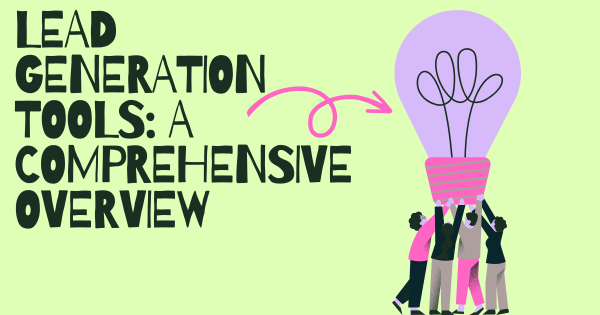Lead Generation Tools: A Comprehensive Overview

Lead Generation Tools: A Comprehensive Overview
In the rapidly evolving world of digital marketing, lead generation stands as a critical pillar for businesses seeking to grow their customer base and enhance their revenue streams. The right tools can make all the difference in identifying, nurturing, and converting potential leads into loyal customers. In this blog, we’ll explore various lead generation tools, their functionalities, and how they can be effectively integrated into your marketing strategy.
What is Lead Generation?
At its core, lead generation is the process of attracting and converting strangers and prospects into someone who has indicated interest in your company’s product or service. This can take many forms, from social media campaigns to email marketing, but having the right tools in place is crucial for optimizing these efforts.
Types of Lead Generation Tools
- Email Marketing Software
Email marketing remains one of the most effective ways to generate leads. Tools like Mailchimp, Constant Contact allow businesses to segment their audiences, create engaging content, and automate follow-ups. With features like A/B testing, analytics, and customizable templates, these platforms enable marketers to refine their strategies for maximum impact. - Social Media Management Tools
Platforms like Hootsuite, Buffer, and Sprout Social help businesses manage their social media presence effectively. These tools allow for scheduling posts, analyzing engagement metrics, and tracking conversions from social media campaigns. With the rise of social media advertising, these tools have become indispensable for generating leads. - Customer Relationship Management (CRM) Systems
CRM systems such as HubSpot, Salesforce, and Zoho play a vital role in lead generation. They help manage interactions with current and potential customers, allowing businesses to track leads through the sales funnel. By analyzing customer behavior and engagement, CRMs provide valuable insights that can drive targeted marketing efforts. - Landing Page Builders
Tools like Unbounce, Lead pages, and Insta page enable marketers to create optimized landing pages designed specifically for lead generation. These platforms offer templates, A/B testing features, and integration with email marketing tools, ensuring that every landing page effectively captures and converts leads. - Chatbots and Live Chat Tools
Implementing chatbots through platforms like Drift, Intercom, or Zendesk Chat can significantly enhance customer engagement. These tools allow for real-time communication, enabling businesses to capture leads instantly. Chatbots can also qualify leads by asking pre-set questions, saving time for sales teams. - SEO Tools
Tools like SEMrush, and Moz are essential for optimizing website content for search engines. By focusing on keyword research, backlink analysis, and site audits, these tools help improve organic search visibility, driving more traffic to your lead generation efforts. - Lead Enrichment Tools
Tools like Clearbit and ZoomInfo enhance lead generation by providing additional information about prospects. By enriching lead data with demographic and firmographic information, businesses can create more targeted marketing campaigns, increasing the likelihood of conversion.
Integrating Lead Generation Tools into Your Strategy
To maximize the effectiveness of lead generation tools, it’s important to adopt an integrated approach. This involves aligning your email marketing, social media strategies, and CRM data to create a cohesive experience for your potential leads. Here are a few tips:
- Define Your Target Audience: Understand who your ideal customer is. Use analytics tools to gather data on their behaviors and preferences, allowing for more targeted marketing.
- Create Compelling Content: Engaging content is key to attracting leads. Utilize blog posts, ebooks, and webinars that address your audience’s pain points.
- Monitor and Optimize: Use analytics tools to track the performance of your lead generation efforts. Regularly review and adjust your strategies based on what the data shows.
- Nurture Your Leads: Not all leads are ready to convert immediately. Implement drip campaigns and personalized follow-ups to nurture leads over time, building trust and engagement.
Conclusion
In today’s competitive marketplace, leveraging the right lead generation tools can significantly enhance your marketing strategy. By understanding the various options available and how they can work together, businesses can streamline their processes, engage more effectively with potential customers, and ultimately drive higher conversion rates. As you embark on your lead generation journey, remember that the tools you choose should align with your overall business goals, providing value not just for you, but for your customers as well. Embrace the possibilities, and watch your lead generation efforts flourish.








